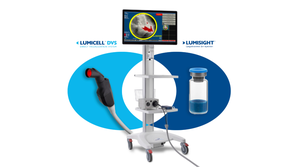July 2, 2001
Originally published MPMN July/August 2001
Hotline
Cross Sealer Makes Pouches from Monolayer Materials
Process results in strong seals and reduced costs A servo-driven cross sealer makes pouch-type seals on lightweight monolayer blown films, an operation formerly only possible with multilayer plastics. The MS-CH-2 sealer from Amplas Inc. (Green Bay, WI) produces clear pouches with three sealed sides from these inexpensive materials at the rate of 60-100 cycles per second. This unique sealing process is made possible through the use of specially coated Teflon bands and a quick-release mechanism that eliminates sticking problems. Once formed, the pouches can be transferred to filling lines for product insertion and closure. |
|
Manufactured by Amplas Inc., this sealer makes pouch-type seals using inexpensive monolayer films. |
Pouch sealers have several benefits over the side sealers they were designed to replace. Pouch machines, unlike side sealers, do not have to cut materials during the sealing process.
This one-task operation makes them less likely to suffer from minor fluctuations in sealing temperature, machine speed, or pick-off timing. "Wide seals running around the product," explains marketing and communications team member Leon Delveaux, "make pouch seals sturdier and more airtight than side seals." The seals are so strong, according to Delveaux, that pouch-sealed bags could replace the resource-intensive plastic trays currently used to store and transport medical devices. The MS-CH-2 sealer is a component system that can be retrofitted to existing sealing machines.
Zachary Turke
Amplas Inc., 200 Packerland Dr., Green Bay, WI 54307-3397; phone: 920/496-0525; fax: 920/496-0560; URL: www.amplas.com
Closed-Loop Wind Tunnel Simulates Convection Airflows
Device is suitable for testing electronics in adverse environments
| "All electronics, and specifically medical equipment, require thermal testing for proper functionality and reliable operation," says Advanced Thermal Solutions (Norwood, MA) CEO Kaveh Azar. "The CLWT-100 provides a controlled and reliable environment to allow for such testing." An integral part of thermal design for many electronic assemblies, wind tunnel testing permits experimental thermal analysis. The CLWT-100 closed-loop wind tunnel is capable of delivering airflows from 0 to 5 m/sec, simulating operating temperatures from -10° to 85°C, and operating at natural convection to 1000 ft/min of airflow. Airflow temperature control is achieved using conventional heaters and refrigeration units. A Delrin frame thermally insulates the test section. Front and side windows made of heat-resistant, multilayer glass panes enable flow visualization. The test section is fitted with 24 ports that can accommodate a variety of cabling and measurement sensors. Adjustable fixturing is provided for specimen mounting. The unit can be adapted to perform tests that are not part of the standard package. Katherine Sweeny |
The CLWT-100 closed-loop wind tunnel from ATS can test the reliability of medical electronics. |
Advanced Thermal Solutions Inc., 89 Access Rd. #27, Norwood, MA 02062; phone: 781/769-2800; fax: 781/769-9979; URL: www.qats.com
Benchtop Plasma System Allows Remote Process Monitoring
Organic, metallic, and composite substrates can be treated
Designed for laboratory and production use, a benchtop plasma system is suited for surface modification and cleaning of organic, metallic, and composite substrates. Developed by MetroLine Inc. (Corona, CA), the M4L RF system's applications include precision cleaning, adhesion enhancement, and surface modification of polymers. The unit's networking capability allows users to program, monitor, and modify processing parameters from remote locations via Ethernet or the Internet. Features include a Windows-based, 10.4-in. color touch screen interface offering fully automatic control, multistep recipes, real-time graphic display, and real-time SPC monitoring. Process data can be examined on a variety of spreadsheet or statistics programs. The aluminum chamber features a high-conductance KF 40 port, isolation valve, and shielded view port. The system's large 9 x 13 x 20-in. capacity allows simple loading of parts on trays. Complex shapes and small geometries can be repeatably plasma treated. |
|
A benchtop plasma system can be programmed and monitored via Ethernet or the Internet. |
Power and safety features include an integrated, air-cooled 13.56-MHz RF generator with an output range of 0–600 W; AutoMatch impedance optimization between generator and electrode; safety interlocks to protect the operator from RF power contact; and built-in system diagnostics.
Karim Marouf
MetroLine Industries Inc., 251 Corporate Terr., Corona, CA 92879-6000; phone: 909/371-2500; fax: 909/371-9792; URL: www.metrolineindustries.com
Medical Product Manufacturing News is always on the lookout for innovative products and services. If you are aware of any that have recently been or are about to be introduced, please call the Managing Editor, Susan Wallace at 310/445-4265.
Copyright ©2001 Medical Product Manufacturing News
You May Also Like





